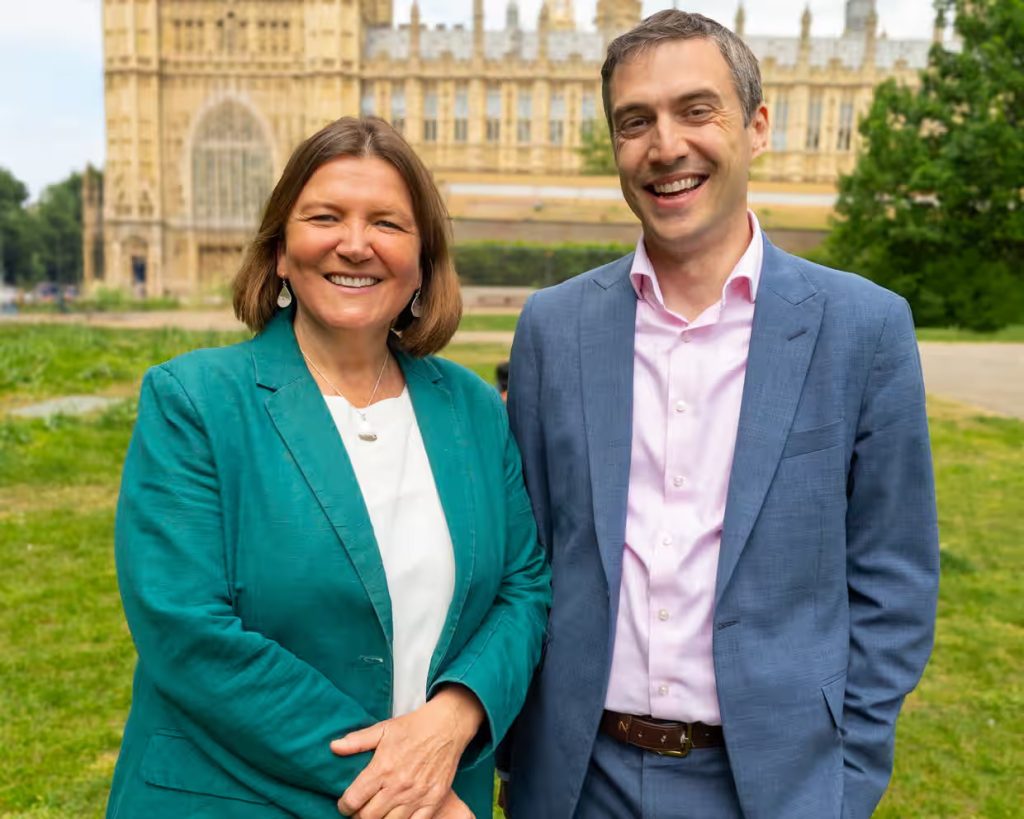Here we are again. Just like in 2021, the Green Party finds itself at a familiar crossroads: choosing between candidates who represent a polished, election-driven strategy and those who lean into grassroots activism and radical change.
This time, the establishment side is represented by Adrian Ramsay and Ellie Chowns. Both are sitting MPs, and Ramsay is currently co-leader. In 2021, he and Carla Denyer defeated Amelia Womack and Tamsin Omond on a platform centered around professionalizing the party and achieving electoral gains.
Although Womack wasn’t exactly an outsider—she had served as deputy leader for seven years—her partnership with Omond, a climate activist and Extinction Rebellion co-founder, signaled a campaign appealing to younger members and those more aligned with protest movements than party politics.
Now, as members across England and Wales prepare to vote in this summer’s leadership contest, Ramsay and Chowns are facing Zack Polanski. Since stepping into the deputy leader role in 2022, Polanski has been pushing to reposition the Greens as a broad-based, “eco-populist” movement. He envisions a party that combines electoral ambition with mass mobilization, hoping to tap into the kind of resonance seen in Reform UK, which currently polls at triple the Greens’ level and boasts a membership four times larger.
While Polanski embraces the value of elections—he’s a London Assembly member with parliamentary ambitions—his vision is more insurgent. He argues that the Greens need to connect with disaffected voters and broaden their appeal if they want to compete seriously on the national stage.
Ramsay and Chowns, by contrast, will likely campaign on continuity. They can point to the successes of the current leadership, especially in building up a strong local councillor base—an effort designed to pave the way for more parliamentary seats.
When Ramsay and Denyer succeeded Siân Berry and Jonathan Bartley, they committed to growing the party through practical, ground-level gains. That strategy has delivered visible results, and it now forms the foundation of Ramsay and Chowns’ case to members: stick with what’s working.
The question for Green members this August will be whether to stay the course with a proven strategy, or pivot toward a more populist, activist-driven approach that aims to shake up the status quo.
As with previous contests, this is not just a battle of personalities but a deeper debate about the party’s future: how it grows, whom it represents, and what kind of political force it wants to be.
Should the Greens aim to mirror the mainstream with a climate-conscious twist, or distinguish themselves with a more radical, movement-led identity?
The outcome will shape not just the next few years of leadership, but potentially the trajectory of the party itself as it seeks to turn climate concern into real political power.

In 2023, the Green Party leadership made a bold pledge: to win four targeted Westminster seats. At the time, many political observers—and even some within the party—saw this as overly ambitious. Yet, just nine months later, during the general election, the Greens delivered on that promise.
Two of the wins came in areas where the party was already strong and competing primarily with Labour. Siân Berry succeeded Caroline Lucas in Brighton Pavilion, ensuring continuity in the Greens’ most iconic seat. Meanwhile, Carla Denyer ousted Labour frontbencher Thangam Debbonaire in Bristol Central, a dramatic shift in a city where Denyer had served as a councillor since 2015.
Even more striking were the victories claimed by Adrian Ramsay and Ellie Chowns in Conservative heartlands. Ramsay captured the new constituency of Waveney Valley, spanning parts of Norfolk and Suffolk, while Chowns overturned a massive near-25,000 Tory majority to win North Herefordshire.
These wins have allowed Ramsay and Chowns to present themselves as models of the Green Party’s long-term electoral strategy—building a national presence through sustained local engagement. Both had previously served as councillors in the constituencies they eventually won, underscoring the value of local groundwork in securing parliamentary seats.
That model is being scaled nationally. The Greens now boast more than 850 councillors across over 180 local authorities and placed second in 40 parliamentary constituencies in the last election—a signal of growing traction in many parts of the country.
Zack Polanski, however, does not reject this groundwork-oriented strategy. Instead, he argues it should be complemented by a bolder, more provocative approach to policy and communications—one that cuts through to voters more rapidly and energetically.
Polanski, who has a background in acting and handles tough media interviews with ease, stands out as a charismatic communicator. But his policy stances, such as a recent call for the UK to leave what he called an “outdated” NATO, have raised eyebrows and could alienate more cautious party members.
As the Greens approach their leadership election, the contest reflects a deeper ideological and strategic divide: one side advocating a steady, electoral path that has shown success; the other pushing for a more radical, populist direction to rapidly expand the party’s reach and appeal.
This will be the first leadership election since 2021—unusually long for a party that typically holds one every two years. Ramsay and Denyer’s three-year term was extended due to a mid-cycle change in leadership and the scheduling of the general election, which further postponed the vote.
One wildcard in the race is turnout. Though the Green Party is still smaller than Reform UK, it has grown significantly, now counting more than 60,000 members. In 2021, Ramsay and Denyer won comfortably, with only 5,000 first-round votes cast, on a turnout of about 20%. This time, if either camp can energize its supporters, the outcome could be far less predictable.
At stake is not just who leads the party, but how it defines its purpose and position in British politics over the coming years: steady builders of a Green parliamentary base, or catalysts of a more disruptive, populist surge.

